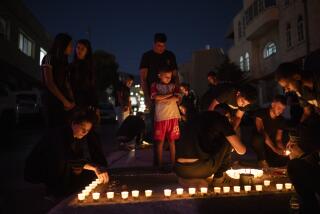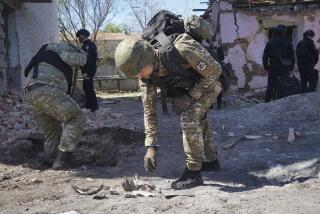Possibility of Early Ground War Stirs Concern : Congress: Many in the House and Senate are lobbying against what they see as a premature move.
- Share via
WASHINGTON — Growing numbers of lawmakers say they believe U.S. military commanders are feeling pressure to launch a ground offensive soon against heavily entrenched Iraqi troops, a strategy shift that could end the war earlier but at the cost of higher casualties.
The concern has mounted as House and Senate members have received daily briefings by Bush Administration officials about the progress of the Persian Gulf War. Many lawmakers are using those sessions to lobby vigorously behind the scenes against an accelerated ground offensive.
House Armed Services Committee Chairman Les Aspin (D-Wis.) will voice the concern publicly today in a speech urging that the Pentagon stick to its bombing campaign, despite the setbacks of bad weather and Scud missile attacks on Israel and Saudi Arabia.
“The ground war is a growing option, and it makes a lot of us uneasy,” Rep. Bill Richardson (D-N.M.) said after a closed military briefing Tuesday.
Pentagon officials have laid out a strategy under which air attacks would last two to three weeks, setting the stage for a forward lunge by ground troops. Defense sources have insisted that the ground war would not begin until extensive allied bombing had weakened dug-in Iraqi troops defending the borders of Kuwait and southern Iraq.
They also want to ensure that allied forces have achieved mastery of the air, so that ground troops can be supported by helicopters and warplanes as they advance against the Iraqi fortifications.
Less than a week into the war, top Pentagon officials have been insisting that they would stick to their methodical plan of accomplishing all that they possibly can through air attacks before launching a ground offensive.
“We’re going to do this in our good time. We’ve got a timetable, it’s been approved, and we’re going to stick with it. I don’t know anyone trying to speed it up or slow it down,” one Defense Department official said.
However, in Saudi Arabia, some U.S. troops who would be involved in any land offensive have indicated that they expect to go on the attack within days.
Allied forces already have begun bombing Iraqi ground troops and their supply lines in an effort to weaken Iraq’s ability to withstand a ground war, in accordance with the original plan.
If there is pressure to move the war to the ground more quickly, it may reflect a concern by military commanders that they risk losing public support if they fail to bring the war to a speedy end. Lawmakers say they are sensing a similar impatience among some in their own ranks.
Ironically, military analysts said, the very evidence that the air war is working--the dramatic televised pictures of high-tech weaponry devastating key parts of Iraq’s military machine--may be building unrealistic public expectations that the war can be won quickly.
“It’s a two-edged sword. If you come out and say, ‘Look how well we’ve done,’ people say, ‘Why isn’t it over? The Israelis beat them in six days,’ ” said Lawrence J. Korb, a former Pentagon official who now heads the Brookings Institution’s Center for Public Policy Education.
Also, after the initial glowing reports of air attack successes, many lawmakers and other observers were not prepared for the setbacks caused by bad weather and Iraq’s Scud missile attacks.
The White House has ordered military commanders to divert some aircraft from bombing other targets so that they can join the hunt for the mobile launchers.
The difficult desert search took on more urgency Tuesday after a missile strike on Tel Aviv killed at least three people and wounded about 70. The attack increased the likelihood that Israel might be drawn into the war, potentially weakening Arab participation in the anti-Iraq alliance.
Such events seem to take on even more significance, because “this is the first war that is being monitored by the public on an hour-to-hour basis. Our time frame has been incredibly compressed,” said Rep. Chet Edwards (D-Tex.), a member of the House Armed Services Committee.
“I fear the impatience by the American people, Congress or the Administration could force us into a ground war before it is truly necessary,” Edwards said. “Over and over again, (lawmakers urged during the briefings) that we do everything possible in the air before we go into a tank-to-tank, soldier-to-soldier battle.”
Some in Congress argue, however, that a ground war does not necessarily mean massive casualties, and should not be approached with such dread.
“There’s an education process that has to be done,” said Rep. Dave McCurdy (D-Okla.), a member of the Armed Services Committee and an influential lawmaker on defense issues. “There is a misunderstanding about what a ground war would entail. Bringing in ground forces does not necessarily equate to large numbers of body bags.”
Times staff writer Melissa Healy contributed to this report.
WHERE THE ARMIES ARE
Here is a rough layout of the opposing armies’ deployment around Kuwait, according to published accounts.
Iraqi forces: Troops in Kuwait have dug in using the multi-layered defense backed by mobile troops and heavy artillery that thwarted Iranian “human wave” attacks n the 1980-1988 Iran-Iraq war.
Coalition forces: In recent days, troops have reportedly moved up from coastal staging camps to jump-off positions for a potential assault.
Source: The Economist
More to Read
Get the L.A. Times Politics newsletter
Deeply reported insights into legislation, politics and policy from Sacramento, Washington and beyond. In your inbox twice per week.
You may occasionally receive promotional content from the Los Angeles Times.










